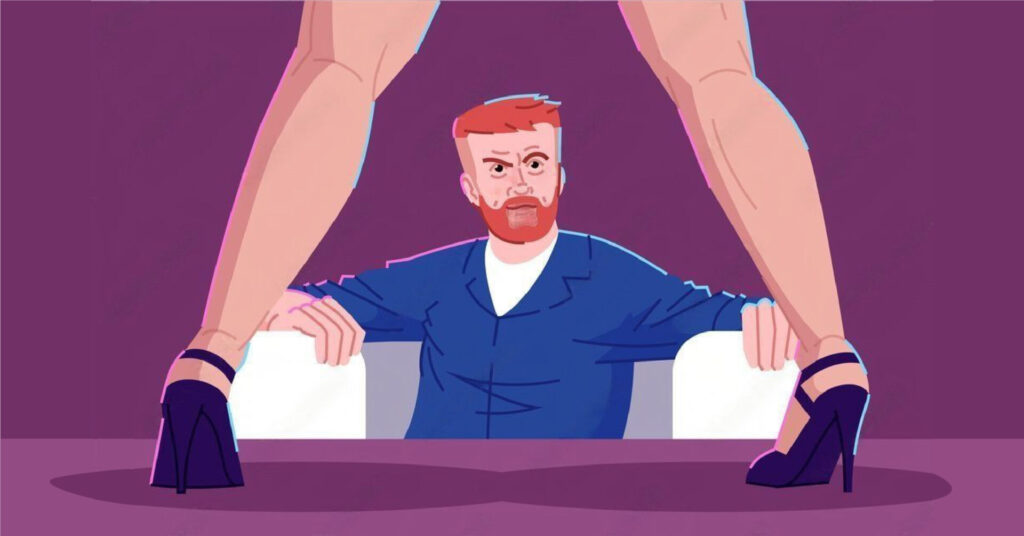Sex has always been looked at as a pleasurable act and an integral part of a romantic relationship that contributes largely to forming intimacy in a couple. It is a physiological need and is considered almost equally important as food or breathing in a hierarchy of needs theory given by Abrahim Maslow, 1943.
The act of sex is considered a must for the survival of human beings. It is placed as a basic need before one achieves higher levels of motivation (Theory of hierarchy of needs, by Abrahim Maslow, 1943).
One’s libido controls and acts as a base for all the interest one has for sex, hence is also referred to as sex appetite. Brain functions can influence this, hormonal shifts, learned behaviour and mental state, and stress. Although some people have a generally high libido, which is characterised by having a higher sex drive than ordinary people.
A question that follows, in this case, is, do these people with a higher libido have a sex addiction? All the people with high libido do not necessarily have sex addiction symptoms, but all the sex addicts naturally have either acquired or naturally higher libido.
Although the significant difference between having sex addiction and just a high libido is that sex addiction makes one dysfunctional when deprived of it and causes significant distress as the urge intensifies from time to time.
Sex addiction symptoms are characterised by the extreme and uncontrollable urge for sexual intercourse, compulsive sexual behaviour, excessive preoccupation with sexual fantasies, and has severe adverse effects on different areas of one’s life. Sex addiction is also known as hypersexuality disorder because hypersexuality as a coping mechanism is a dominant feature of the problem.
What Causes Sexual Addiction?
There are a lot of factors that form the etiology of sex addiction or hypersexuality disorder. For any addiction to develop, there are a lot of factors that add up throughout their lifespan, such as inheritance, upbringing, traumatic experiences, etc. So it becomes essential to check for causes through different perspectives.
1. Biological
There are chances of genetic predispositions of impulsivity and sensation-seeking urges that can contribute to sex addiction. If one has higher levels of libido due to higher levels of testosterone and estrogen, it might lead to sex addiction, and it can increase impulsivity related to sexual behaviours. Changes in the neurotransmitters in the brain like serotonin, dopamine, oxytocin, norepinephrine, endorphins, melanocortins can reflect in hypersexuality.
2. Psychological
If an individual is exposed to inappropriate sexual content in childhood or goes through sexual abuse at an early stage, it can negatively impact his cognition and perception. This might lead them to adopt hypersexuality as a coping mechanism to different stressors in life. It interferes with their decision-making and has adverse effects making them prone to many physical risks as well. Personality disorders, depression, anxiety can also be present simultaneously with sex addiction. The manic state in psychological conditions like bipolar disorder can make one tend towards engaging in extremely compulsive and risky sexual behaviour.
3. Social
If an individual faces rejection in social groups or extreme conflicts in interpersonal relationships, he may tend towards unhealthy coping strategies like sexual gratification. It might also result in sexual misconduct. Another important factor contributing to the development of sex addiction can be the influence of friends, peers, or colleagues that indulge excessively in exchanging sexual content like magazines, pornographic videos or books, etc. An individual might feel left out if he keeps away from this stuff and starts involving himself in the same just to fit in.
A vast spectrum of factors is seen in the etiology of sex addiction, and it depends on the vulnerability and content and event of exposure throughout one’s life. Similarly, the consequences that follow are also life-threatening and can alter essential opportunities in life.
Sex addiction might lead a person to feel incredibly guilty and shameful and develop a poor self-image, which eventually hampers self-confidence. It is always better to reach out and help oneself out of this problem. Sex addiction requires treatment, and the following are some ways that can help reduce the symptoms.
Effects of Sex Addiction
Sex addiction like any other addiction creates a lot of dependency of satisfaction and peace over the sexual activity. It becomes a compulsion for the individual. Compulsive sexual behaviours increase creating disharmony in normal routine.
The psychological dependency over sex makes it difficult for one to concentrate on other activities & develops chances of becoming unresponsive to other pleasurable stimuli.
Excessive and compulsive sexual behaviours put an individual at the risk of indulging into harmful, non consensual and forceful sexual activities.
Sex addiction can cause physical problems like pain in specific organs not necessarily involved in sexual activities. It might develop fatigue and lethargic mood.

Sex addiction can be overcome.
A step towards healthy sex life.
Get Help for Sex addiction
Therapies:
Therapeutic interventions work best against addictions. Psychological therapies are designed in a way that helps you identify your emotions and work on the feelings that are hurting.
- CBT (cognitive behavioural therapy) helps best as it helps to identify triggers, recognize and change the risky patterns and behaviours. It helps with replacing the attitudes and thoughts with different engagements. Non-sexual acts can be introduced in order to desensitize oneself when confronted with a similar situation.
- Psychodynamic therapy is another approach that helps better understand the reflection on self. It also traces the root causes like fear, anger, shame, or guilt that lead one to adapt to an unhealthy sexual pattern.
- Motivational Enhancement therapy is another different approach that helps overcome sex addiction. The therapist helps the client to gain better insights into the problem and then motivates them to set goals to ease the process of developing a healthier attitude towards sex.
Family therapy, couples therapy, and exposure to some other therapies that involve external factors like family members, objects, places can be used for betterment and often prove to be successful for some.
Overcoming Sex Addiction?
Distractions and replacement
Identify your set of interests and passions and plan accordingly. Whenever you come across a trigger of arousal, try to distract yourself from the scheduled activity. You can even replace unhealthy behaviour with some healthier patterns and interests. Later, reward yourself for that with a small treat.
Keep a record
Track your progress. Make a journal where you write down your predictions and actions. Once you see that you can control it once, it will slowly give you the motivation to continue and reduce the symptoms gradually.
Exercising
When you exercise, a happy hormone called endorphin is released in the brain, making you feel contented, comfortable, and satisfied. The same hormone is released when one engages in actions of addiction. So it is better to replace it with exercise.
After knowing the symptoms, causes, and treatment for sex addiction, it is also important to remember that where there is a will, there is a way. Everything is possible when you have the baseline of wanting to help yourself out. Sex addiction is harmful for many reasons, but it is curable, and one can get back to leading everyday life again. Motivate yourself and reach out for help well in time.
Read More:
Porn addiction: Symptoms, Effects, Causes, and Treatment for Porn Addiction
Paging Dr. Internet: The Problem with Over-Pathologizing and Self-Diagnosis









